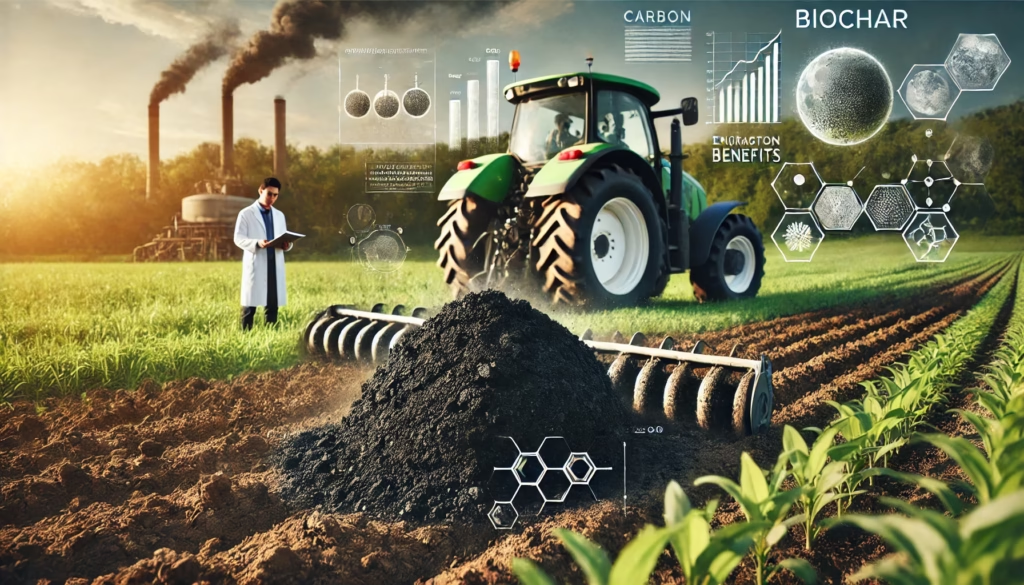1. Biochar Production and Soil Carbon Sequestration
Biochar is created by heating organic waste (e.g., crop residues, wood chips) in a low-oxygen environment, locking carbon into a stable form. When applied to soil, it reduces greenhouse gas emissions by sequestering carbon for centuries (Lehmann et al., 2021). For example, Brazilian sugarcane farms using biochar from bagasse waste have reported a 20% reduction in CO₂-equivalent emissions over five years (Carvalho et al., 2022).

Key Benefits:
- Enhances soil structure and water-holding capacity.
- Reduces reliance on synthetic fertilizers by retaining nutrients like nitrogen and phosphorus.
Challenge: High initial energy input for pyrolysis and lack of decentralized production facilities.
2. Nutrient Retention and Crop Yield Enhancement
Biochar’s porous structure acts as a habitat for beneficial microbes and a sponge for nutrients. In degraded soils, trials in sub-Saharan Africa demonstrated:
- Maize yields increased by 15–25% with biochar-amended compost (Karanja et al., 2020).
- Reduced leaching of nitrates into groundwater by 30% (Rondon et al., 2019).
Implementation: Smallholder farmers in Cambodia integrate rice husk biochar with traditional compost, cutting fertilizer costs by 40% (FAO, 2023).
3. Circular Economy Synergies
Biochar systems repurpose agricultural and urban waste:
- Coffee husks in Colombia are converted into biochar for coffee nurseries, closing nutrient loops.
- Municipal green waste in the EU is pyrolyzed to produce biochar for urban rooftop farms.
Policy Gap: Incentives for waste-to-biochar initiatives remain fragmented, particularly in developing nations.
4. Socioeconomic Barriers to Adoption
Despite its benefits, biochar adoption faces hurdles:
- Cost: Small-scale pyrolysis units cost $5,000–$10,000, unaffordable for most smallholders.
- Knowledge Gaps: Limited extension services to train farmers in application rates.
Solutions:
- Cooperative models (e.g., Kenya’s Biochar Africa Initiative) pool resources for shared pyrolysis systems.
- Carbon credit programs to offset production costs.
Emerging Innovations and Scalability
Recent advancements aim to democratize biochar use:
- Mobile pyrolysis units serve multiple villages, reducing transportation costs.
- AI-driven sensors optimize biochar application based on soil pH and crop needs (CGIAR, 2023).
Conclusion
Biochar bridges climate action and agricultural productivity, yet its potential remains untapped. Policymakers must prioritize subsidies for pyrolysis technology, farmer education, and carbon markets to unlock large-scale adoption. Collaborative research between agronomists and engineers is critical to refine low-cost production methods.
References
- Nosenzo, S. G. (n.d.). Evaluating sugarcane bagasse-based biochar as an economically viable catalyst for agricultural and environmental advancement in Brazil through scenario-based economic modeling. PSR Energy Consulting and Analytics.
- Sriphirom, P., Chidthaisong, A., Yagi, K., & Tripetchkul, S. (2019). Evaluation of biochar applications combined with alternate wetting and drying (AWD) water management in rice fields as a methane mitigation option for farmers’ adoption. Soil Science and Plant Nutrition, 66(3), 1–12. https://doi.org/10.1080/00380768.2019.1706431
- Kätterer, T., Roobroeck, D., Kimutai, G., et al. (2022). Maize grain yield responses to realistic biochar application rates on smallholder farms in Kenya. Agronomy for Sustainable Development, 42, 63. https://doi.org/10.1007/s13593-022-00793-5
- Woolf, D., Lehmann, J., Cowie, A., Cayuela, M. L., Whitman, T., & Sohi, S. (n.d.). Biochar for climate change mitigation: Navigating from science to evidence-based policy. [Publisher details unavailable].
- Saarnio, S., Heimonen, K., & Kettunen, R. (2013). Biochar reduces short-term nitrate leaching from A horizon in an apple orchard. Journal of Environmental Quality, 42(1), 76–82. https://doi.org/10.2134/jeq2012.0250
For those seeking to understand and implement Biochar, explore Agri AI: Smart Farming Advisor that can provide you with relevant insights .

Leave a Reply